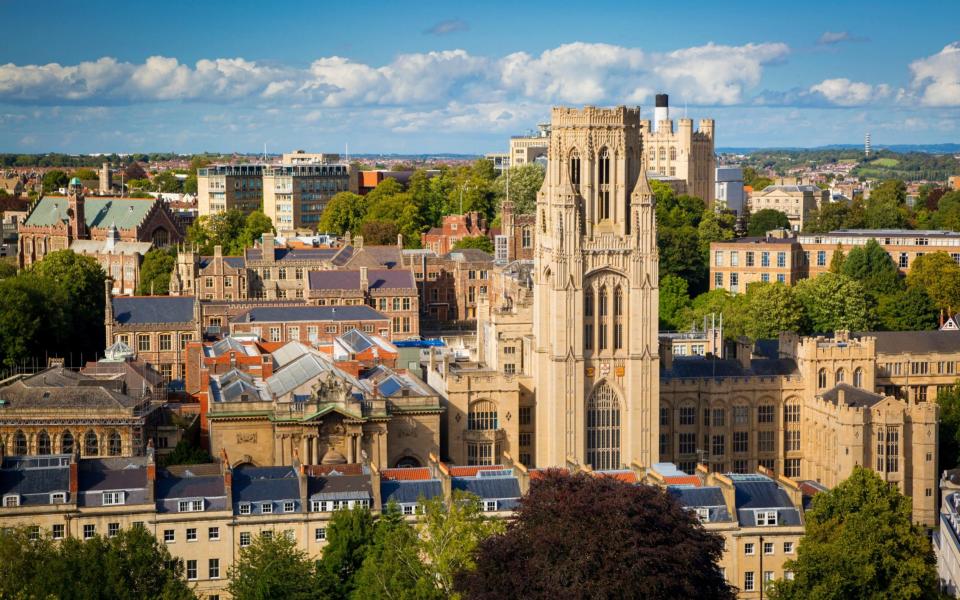Students inspired by Rhodes Must Fall campaign demand Bristol University change name of Wills Tower over 'slave trade' links

Students at the University of Bristol have demanded that one of the city’s most famous landmarks, the Wills Memorial Tower, be renamed due to its alleged links to the slave trade, it has emerged.
The Tower, the protesters allege, “glorifies” the slave trade because its namesake, Henry Overton Wills III, Bristol’s founding chancellor, used profits from his investments in the tobacco trade to fund the university’s royal charter.
Inspired by the controversial Rhodes Must Fall campaign at Oriel College, Oxford, the students claim that the building undermines the university’s commitment to “diversity and inclusivity” and symbolises a “toleration” of former slave masters.
Should the university’s management bow to their demands, the protesters demand that the Wills Tower be renamed after “somebody the entire university population can be proud of.”
Launching a petition on Monday, the students add: “Every student who first attends Bristol cannot help but notice the grand prominence of Wills Memorial Building at the top of Park Street.
“However, little know the history behind the name - enter Henry Overton Wills III. As honoured within the building itself, H.O. Wills is known best for being the first chancellor of the university; less people are aware that this position was granted to him after financing the university with slave-profited money.
“While we begrudgingly understand that Bristol has a historical connection to the slave trade, we find it hard to accept that the university still glorifies an individual who advocated such an immoral practice.
“We also find it ironic that the building is often the setting for events hosting some of this century's most progressive thinkers.”

Known as one of the last great Gothic buildings to be built in England, the grade II listed building was designed by the architect Sir George Oatley and was opened in 1925 as a memorial to Wills by his sons George and Henry Wills IV.
It is considered by many to be synonymous with the university and remains the centrepiece of the university precinct, housing both the School of Law and the Department of Earth Sciences.
Born in 1828, Wills was a British businessman who entered into his family’s firm, W.D. & H.O. Wills, between 1846 and 1880, accruing a vast fortune through the company’s investment in its tobacco arm.
The company later merged with other firms in 1901 to become Imperial Tobacco, now the fourth-largest cigarette company in the world.
The students’ claims that Wills’ riches were derived from his association to the slave trade are fiercely disputed by Imperial Tobacco, which say there is no evidence of the company’s involvement in slavery.
However, it is believed that the Bristolian may have continued to import slave-grown tobacco from American plantations up until the American Civil War in 1865 - more than three decades after slavery was abolished under the 1833 Abolition Act.
Wills later produced a letter in 1908, aged 80, promising £100,000 to found a university for Bristol. The university was granted a royal charter the following year, with Wills announced as its first chancellor.
The Wills Tower was commissioned in 1912, a year after his death, and was funded by his sons through the proceeds of the company.
Responding to the petition, a spokesman for the university said that it would be “disingenuous” to “cover up” the university’s historical relationship with the Wills family, adding that it was important to be “open and reflective about our history”.
However, they added that the university had only learnt of the petition on Monday, and was still in the process of considering the students’ demands.
“‘In 1908, a substantial gift of £100,000 from Henry Overton Wills III helped to establish our University, and a year later, partly as a consequence of that gift, we were awarded a Royal Charter,” he added.
“We have never sought to hide our association with the Wills family. We believe that it is important to be open and reflective about our history, and the city’s historical connection to the slave trade.
“To us, it would seem disingenuous to seek to deny or cover up our relationship with the family. We would welcome the chance to discuss this further with the organisers of this petition.”

 Yahoo News
Yahoo News 